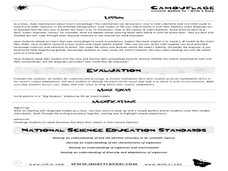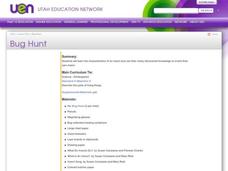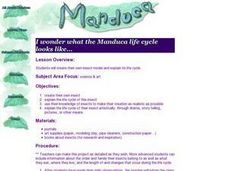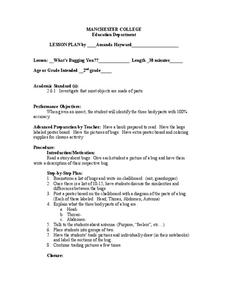Curated OER
Insects and Spiders
Students make either and insect or a spider using materials their teacher provides. They then draw of picture of their organism and defend why it is either a spider or an insect.
Curated OER
Insect Classification
Learners compare and contrast the visible structures of three insects based on photographs. They differentiate characteristics of crane flies, ants, and wasps then create a simple classification system.
Houghton Mifflin Harcourt
Zombie Ants
One of the creepiest and coolest natural occurrences is a great forum for data analysis and discussion! Explore the phenomenon of zombie ants, or ants infected with the Cordyceps fungus, with a series of activities and experiments. Kids...
Curated OER
Did You Know?
What would happen if you woke up one day and had become a housefly? What kinds of things would you do? Use the facts at the top of a worksheet to write a paragraph or short story about being a housefly.
Curated OER
A Bug's Life
In this biology worksheet, students create a presentation for a museum about the children they encounter during their journey as an insect. They identify the types of food the insect eats and its habitat. Students also describe their...
Curated OER
Camouflage: A Study of Stealth and Survival
Students study insect camouflage. In this organisms lesson, students design and create their own 3D insect models to blend into a habitat. Students write a paragraph about the camouflage their insect has and explain how their insect is...
Curated OER
Bug Hunt
Students study the characteristics of an insect and use their newly discovered knowledge to invent their own insect. They go on a class bug hunt, using the tools and supplies that biologists use when they go out in the field.
Curated OER
Bug Sweep
Students observe and categorize insects. In this insects science instructional activity, students create a bug catcher out of a coat hanger and plastic bag, then collect bugs from the schoolyard. Students count and categorize the insects...
Curated OER
The Greatest Show on Earth: The World's Smallest Animals
Students create instruments to capture different types of insects. In this The Greatest Show on Earth: The World's Smallest Animals lesson plan, students compare the attributes of certain insects and record the data on a chart. After...
Curated OER
Activity Plan 5-6: Bugs, Bugs, Bugs!
Students become entomologists for a day. In this life science lesson, students go on an insect hunt and investigate insects and their homes. This leads to the creation of an insect by each student. Lesson includes a take-home activity...
Curated OER
Comparing and Collecting Bugs
Students differentiate between insects and non-insects. For this insects lesson, students review the attributes of insects and take a nature walk to look for insect homes. Students use resource books to identify the names of insects seen...
Curated OER
Web of Life
Students construct a web of life. In this ecosystem activity students are introduced to ecosystems and life cycles. Insects are the main focus.
Curated OER
I Wonder What the Manduca Life Cycle Looks Like
Students create their own insect, build a model of it and explain its life cycle.
Curated OER
Bugging Out
Students explore how insects behave in their natural habitats and build dioramas to create an Insect World in their classroom. They investigate various insects and the roles they play in the environment. They write creative short...
Curated OER
So You Think You're Tough
Fourth graders learn how to classify animals. In this invertebrates lesson, 4th graders discuss how we classify thinks into groups and move into a discussion about classifying animals. Students learn about the differences between...
Curated OER
Bugs-Eye View
Students research different bugs and insects and write letters from bugs' and insects' points of view to humankind.
Curated OER
Bugs
Students participate in an after school program that promotes communications skills, hypothesizing, exploring, recording of data, leadership roles and making comparisons. They explore the world of insects, where they come from, how they...
Curated OER
Habitat Breakdown
Students investigate the fragility of insects and organisms and their survival needs. In this habitat lesson plan, students discuss what elements they need to survive day to day, then hypothesize what they would need to live as an...
Curated OER
Metamorphosis
Students complete a unit about the insect metamorphosis process. They read and discuss a handout and sequence the events of metamorphosis for a variety of insects. Students also view and hold a tobacco hornworm, and complete a...
Curated OER
Going Buggy? Scavenger Hunt
In this insects worksheet, students utilize the Internet to access a specific website to locate the answers to five short answer questions involving insects.
Curated OER
Arthropod Coloring
In this arthropod worksheet, students compare and contrast the different animals found in the Phylum Arthropoda: insects, arachnids, and crustaceans. Students complete 8 fill in the blank statements and color illustrations.
Curated OER
What's Bugging You?
Second graders investigate insects. In this parts of a whole, 2nd graders discuss what the three body parts of an insect are as well as the antenna. Students create their own insect labeling each body part and antenna.
Curated OER
The Spider Beside Her
Second graders are introduced to the characteristics of spiders. In groups, they compare and contrast spiders to different insects to discover spiders are not an insect at all. In groups, they create a model of a spider and discuss its...
Curated OER
Take an Ant to Lunch
Second graders construct a model of an ant, exemplifying that ants are insects. Students gather data create a pictograph chart to show ant food preferences. Also, 2nd graders access the Internet to explore ant eating habits.
Other popular searches
- Insects Science
- Bugs and Insects
- Insects Word Search
- Esl Social Studies Insects
- Beneficial Insects
- Insects Basic Needs
- Insects Crossword
- Rain Forest Insects
- Arachnids and Insects
- Insects Butterflies
- Insects Math
- Dewey Insects

























